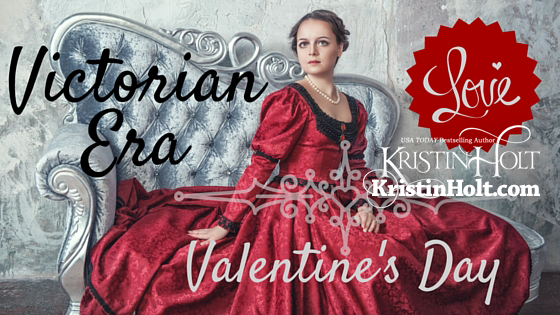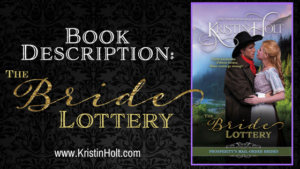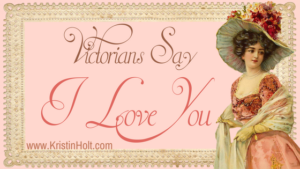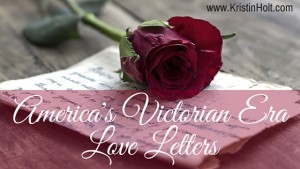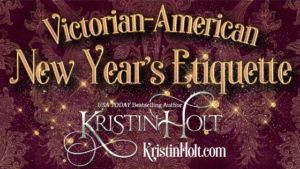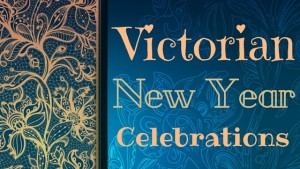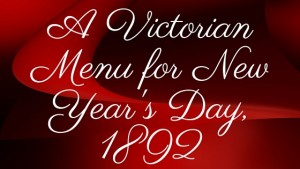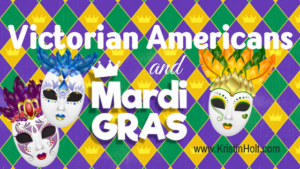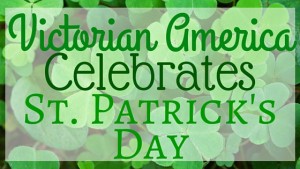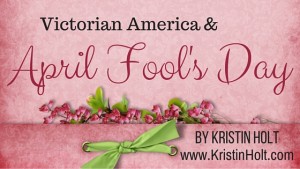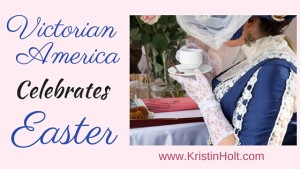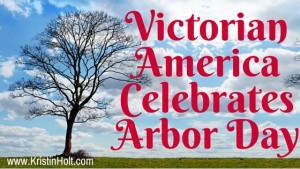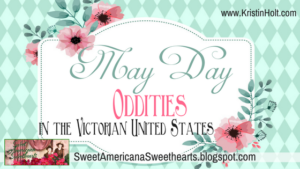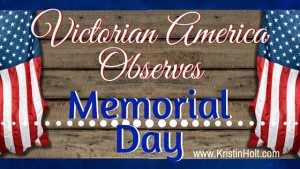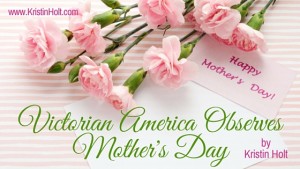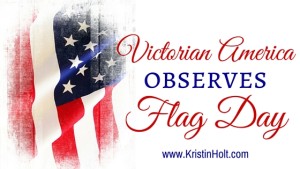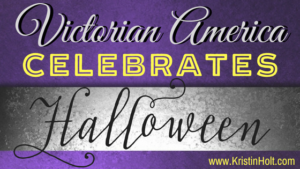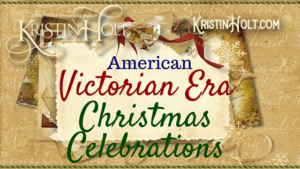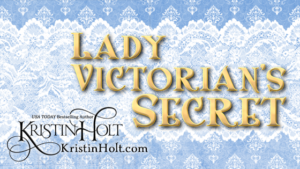Victorian Era Valentine’s Day
Victorian Era Valentine’s Day
.
The Victorian Era was a time of Romanticism: flowery language, love letters as a part of courtship; the protection of sweethearts, wives, and mothers and sheltering beloved females from the coarser realities of the world. Courtship involved the wooing of a special woman often through poetry, written expressions of tender feelings, and just the right turn of phrase in conversation.
.
History of Valentine’s Day
.
In America’s Victorian Era, observing Valentine’s Day was an important and significant holiday. Newspaper accounts throughout the decades often recall the ancient Roman history of Valentine’s Day, including the origin of the name, customs, and more. The following article is representative of many present throughout the era’s papers, citing English and Scottish historical traditions:
.
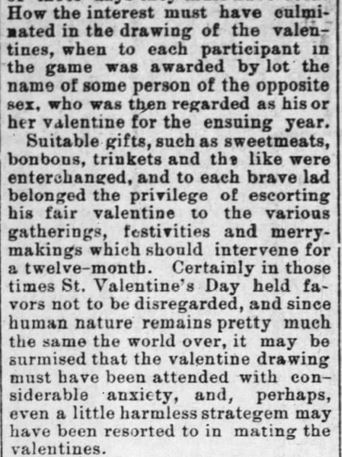
Old Valentine Pairing. The Wilmington Messenger. Friday, February 14, 1890. Likely the tradition that began the time-worn phrase, “Will you be my Valentine?”
.
Late Victorian Era Valentine’s Day
.
“During the late nineteenth century, the occasion of St. Valentine’s Day was a chance for novelty in entertaining. Valentine’s Day party ideas such as luncheons, teas, socials and fancy dress functions of all sorts were easily and artistically arranged with flowers, hearts, darts and cupids. The success of these pleasant social affairs often depended on the theme of the party.” [Source]
.
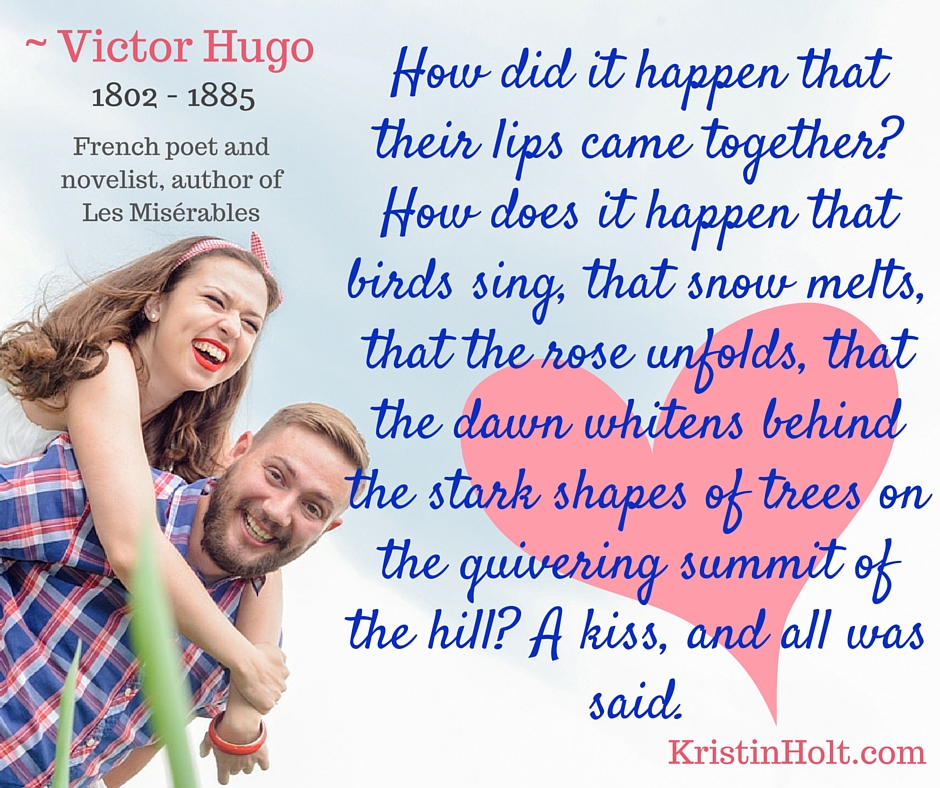
.
“A token of love in the 19th century was a paper hand, which was a symbol of courtship. Tiny paper gloves were also popular. Real gloves had long been a favorite valentine gift, especially in the British Isles were it became a true love token. With them went verses like this:
.
If that from Glove, you take the letter G
Then Glove is Love and that I send to thee.
.
Sometimes the gloves was a way of proposing. If the girl accepted, she wore them to church the following Easter.” [Source]
.
Victorian Valentine’s Etiquette
.
“Rules of Society in Regard to Valentines:”
- Homemade Valentines bespeak stinginess.
- It is always more genteel to prepay the postage on valentines to your sweetheart.
- An inlaid mother-of-pearl valentine is not necessary where only a colored paper one is looked for.
- If there is a snowstorm on St. Valentine’s Day, be sure that there is nothing on your valentine about “slaying.”
- If your sweetheart is named Lucy, do not address an original verse to her. “Goosey” is the only word which rhymes with her name.
.
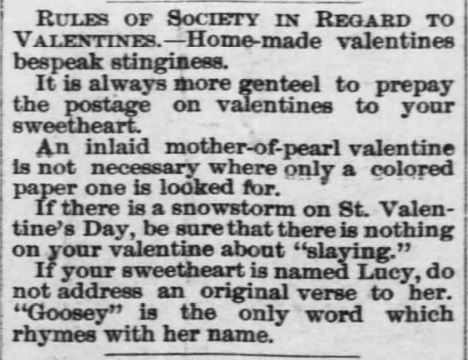
1891 etiquette regarding the presentation of Valentines. From The Weekly Kansas Chief of Troy, Kansas, February 12, 1891.
.
19th Century Valentine’s Day Gifts
.
Newspapers of the day indicate sweethearts (particularly ladies… but gentlemen, too) expected Valentine’s Day gifts from the fellow courting them (or their best gal).
.
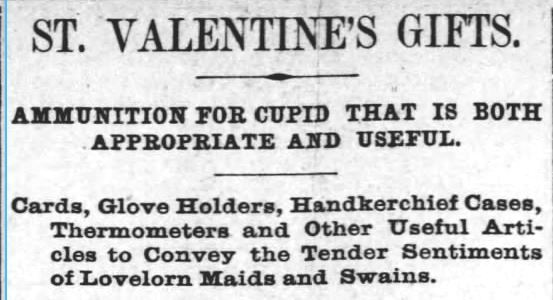
By Special Correspondence from New York, February 5th. St. Louis Post-Dispatch, 8 February, 1891. Article Header. More about swains here.
.
According to the papers, the list of suitable and appropriate Valentine’s Day gifts include:
- Gloves
- Decorative glove boxes with inscribed/imprinted love sentiments
- Handkerchiefs (decorative)
- Decorated hankie boxes with inscribed love phrases and sentiments
- Silver trinkets
- Thermometers (with an appropriate little poem about no matter the weather, his love is true)
- Embroidery scissors
.
COMMERCIALLY PREPARED PAPER VALENTINES for 1894
.
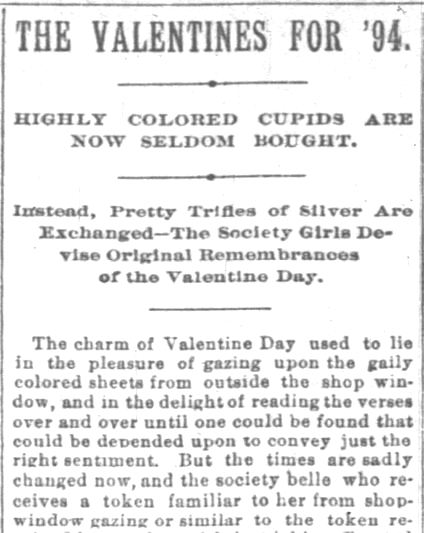
1 of 3: The Indianapolis News. Indianapolis IN. 10 February 1894. The Valentines for ’94. “Original Cards Only”.
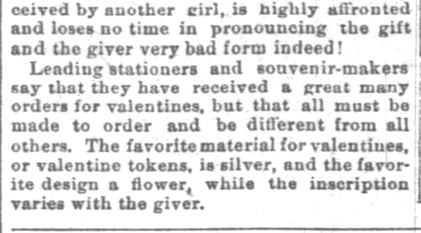
2 of 3: The Indianapolis News. Indianapolis IN. 10 February 1894. The Valentines for ’94. “Original Cards Only”.
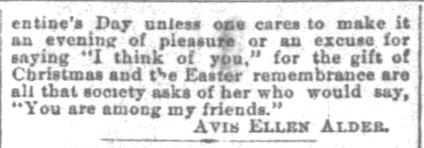
3 0f 3: The Indianapolis News. Indianapolis IN. 10 February 1894. The Valentines for ’94. “Original Cards Only”.
.
Apparently Valentines (sweethearts) became a bit more choosy later in the century. The ad, above, is from 1894. An 1869 valentine advertisement (below) indicates commercially prepared paper valentines were popular and commonplace.
Valentine cards could be mailed so they arrived on Valentine’s Day. Decorum books and pamphlets of the era focus in the necessity of good manners in mailing the card postage paid. Expecting the object of your affections to pay the postage upon delivery was considered a breach of etiquette. Apparently more late Victorian-era mail was delivered for Valentines than for Christmas.
.
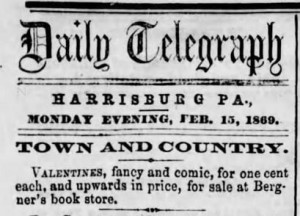
Commercially prepared Valentines for Sale. Harrisburg Telegraph, Harrisburg, PA. 15 February, 1869.
.
Ready-made paper valentines were available from early in the 19th century. The advertisement, above from 1869 shows a book store by the name of Bergner’s offering Valentines (both fancy and comic) for one cent each (and up). By 1889 (20 years later), the average paper valentine cost $5 each… on ‘clearance’, after hours on the 13th.
That $5 in 1889 is equivalent to $131.58 in 2015. OUCH. ( inflation calculator )
.
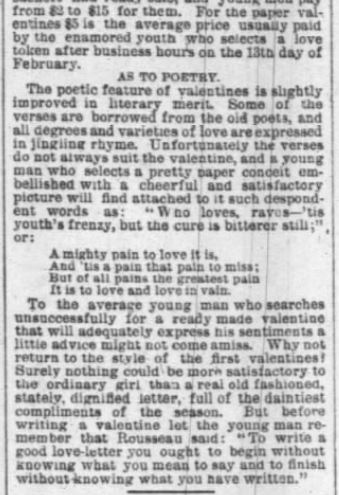
From the Chicago Daily Tribune, Thursday, 14 February 1889, pg 9. The average cost of a paper Valentine, the purpose and necessity of poetry, and strong recommendation for a genuine Love letter.
.
“To write a good love-letter you ought to begin without knowing what you mean to say and to finish without knowing what you have written.” ~Rousseau (quoted from the article, immediately above, from the Chicago Daily Tribune, 14 February 1889, page 9)
.
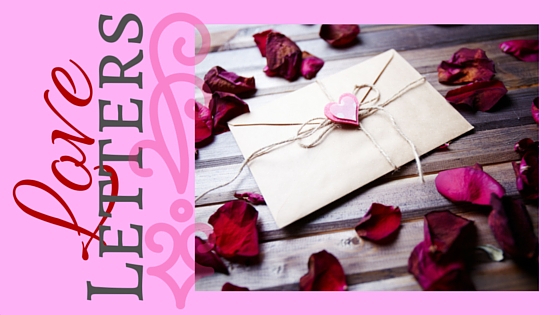
.
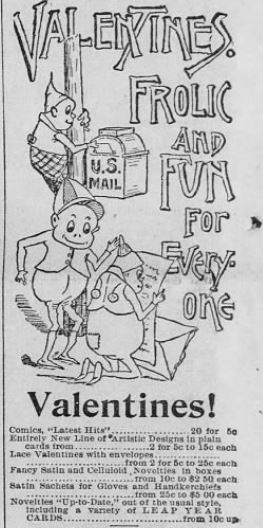
Valentines Advertisement. Note the inclusion of Leap Year cards in the ad. The San Francisco Call, published 9 February 1896.
.
OLD WEST AND VALENTINES
.
But what about the American Old West? The newspaper articles cited above are from San Francisco, Chicago, and points further east. But late enough the Old West” was quite civilized. The transcontinental railway had linked the west coast to the rest of the union. Such things as commercially made valentines were available for purchase.
.
What was available to a man lucky enough to have a wife or sweetheart in the far reaches of frontier America?
.
- Courting Gifts of his own manufacture (wooden carving, a new piece of finely crafted furniture made with his own carpentry skills, even a small painting or sketch, a hand-written poem of his own creation, a pair of hand-sewn leather gloves, and many more options)
- A betrothal gift of family heirloom (a ring from great grandmother, for example)
- A carefully written love letter in his best penmanship as expert handwriting was seen as an art form all of its own
- a handmade greeting card put together with anything at his disposal–knowing ladies like frills and lace and ribbons, maybe even containing such extravagances available at most of the earliest country stores.
- If the years were far enough advanced to have access to a mail-order catalog (and the hard cash to make a purchase), jewelry, hat-pins, watch-pins, chains, rings, etc. Anything a man could want to buy his sweetheart was pretty much available.
- Anything at all his Valentine needs… if he can get his hands on it.
.
.
The Bride Lottery is set in a mining camp a hard stagecoach ride above Leadville, Colorado, in 1881. Sam owns the mercantile and as the arranged-for brides arrive, he stocks his store with courting gifts–anything the miners might want to buy for their gals. But he ends up giving Evelyn fabric to sew herself practical clothing that fits (as her girth is expanding). He’s a bit embarrassed by his decision for a courting gift. After all, how does a man admit his sweetheart needs bigger clothing with offending her tender sensibilities? [A deleted scene, in its entirety, is set in the store… and shows (among other things) the miners perusing the courting gifts.]
.
.
Related Articles
.
.
Related Articles: Victorian American Holiday Observances
.
.
.
Updated March 2022
Copyright © 2016 Kristin Holt, LC
Victorian Era Valentine’s Day Victorian Era Valentine’s Day

